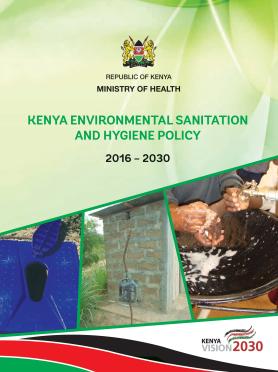Kenya Environmental Sanitation and Hygiene Policy
Kenya Environmental Sanitation and Hygiene Policy
Sanitation is a basic necessity that contributes to better human health, dignity and quality of life. The economic and social benefits of sanitation interventions create more time for productive pursuits, higher productivity, better performance at school and work, lower medical costs. Closer access leads to a better living environment, dignity, safety, convenience, comfort and status. However, in Kenya basic sanitation services are not accessible to the majority of the population. The result is that the poor are deprived of decent and dignified lifestyles leading to deterioration of health, wellbeing and human environment.
The Kenya Environmental Sanitation and Hygiene Policy (KESHP) 2016-2030 provides broad guidelines to both state and non-state actors at all levels to work towards universal access to improved sanitation leading to improved quality of life for the people. Primarily, the KESH policy aims to increase the proportion of the population with access to improved sanitation to 100 percent by 2030 and ensure a clean and healthy environment for all in Kenya. The development of KESHP 2016-2030 is a result of extensive policy review and participatory stakeholder consultations and validation meetings held throughout the country.

